
Death of an Author is a 1947 detective novel by John Rhode, the pen name of the British writer Cecil Street. It is the forty fifth in his long-running series of novels featuring Lancelot Priestley, a Golden Age armchair detective. The New Yorker described it as "Rather pleasant, in a ponderous fashion" while Will Cuppy, writing in the New York Herald Tribune, felt "Mr. Rhode provides one of those satisfying British stories in the old tradition, full of mystery meat and brain-work."
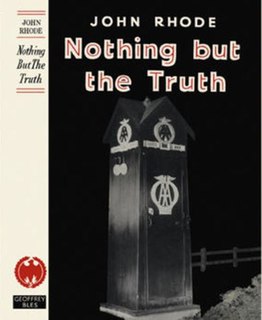
Nothing But the Truth is a 1947 detective novel by John Rhode, the pen name of the British writer Cecil Street. It is the forty forth in his long-running series of novels featuring Lancelot Priestley, a Golden Age armchair detective.

Death in Harley Street is a 1946 detective novel by John Rhode, the pen name of the British writer Cecil Street. It is the forty third in his long-running series of novels featuring Lancelot Priestley, a Golden Age armchair detective. Several sources consider it to be the author's masterpiece.
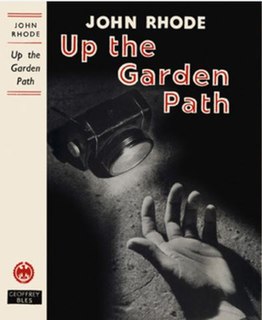
Up the Garden Path is a 1949 detective novel by John Rhode, the pen name of the British writer Cecil Street. It is the forty ninth in his long-running series of novels featuring Lancelot Priestley, a Golden Age armchair detective. It was published in America by Dodd Mead under the alternative title The Fatal Garden. Reviewing the novel in The Observer, Maurice Richardson concluded "Mr. Rhode has lost very little of his grip."
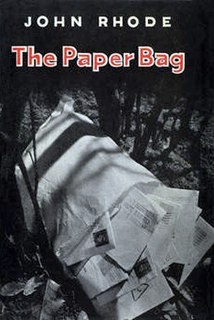
The Paper Bag is a 1948 detective novel by John Rhode, the pen name of the British writer Cecil Street. It is the forty sixth in his long-running series of novels featuring Lancelot Priestley, a Golden Age armchair detective. It was published in America by Dodd Mead under the alternative title The Links in the Chain.

The Two Graphs is a 1950 detective novel by John Rhode, the pen name of the British writer Cecil Street. It is the fiftieth in his long-running series of novels featuring Lancelot Priestley, a Golden Age armchair detective. It was published in America by Dodd Mead under the alternative title Double Identities. Writing in The Observer Maurice Richardson noted a "slight slackening of tension towards the finish but an excellent specimen of Rhode’s later period."
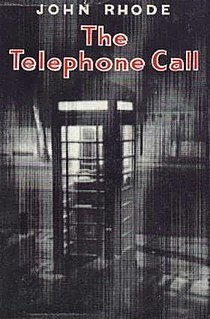
The Telephone Call is a 1948 detective novel by John Rhode, the pen name of the British writer Cecil Street. It is the forty seventh in his long-running series of novels featuring Lancelot Priestley, a Golden Age armchair detective. It was published in America by Dodd Mead under the alternative title Shadow of an Alibi. It is based on the real-life Wallace Case of 1931 in which William Herbert Wallace was convicted of murdering his wife Julia, a conviction which was later overturned on appeal.
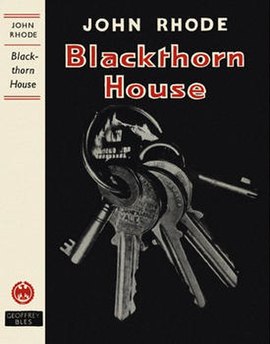
Blackthorn House is a 1949 detective novel by John Rhode, the pen name of the British writer Cecil Street. It is the forty eighth in his long-running series of novels featuring Lancelot Priestley, a Golden Age armchair detective.
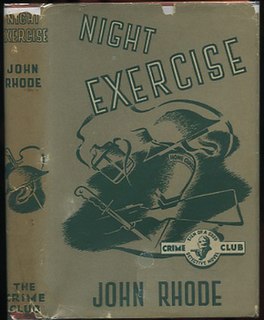
Night Exercise is a 1942 detective novel by John Rhode, the pen name of the British writer Cecil Street. It is a stand-alone wartime novel from Rhode, best known for his long-running series featuring Lancelot Priestley. It was published in America by Dodd Mead under the alternative title Dead of the Night.

Death Invades the Meeting is a 1944 detective novel by John Rhode, the pen name of the British writer Cecil Street. It is the thirty ninth in his long-running series of novels featuring Lancelot Priestley, a Golden Age armchair detective. Reviewing the novel for the Times Literary Supplement Maurice Willson Disher noted "His ingenuity is becoming as delicate to handle as high explosive. His stories may become so difficult to review without saying too much that his triumph will come when they cannot, for discretion’s sake, be reviewed at all."
The Secret Meeting is a 1951 detective novel by John Rhode, the pen name of the British writer Cecil Street. It is the fifty second in his long-running series of novels featuring Lancelot Priestley, a Golden Age armchair detective. It was published in America the same year by Dodd Mead. Unusually for the series it has an early Cold War element.

The Lake House is a 1946 detective novel by John Rhode, the pen name of the British writer Cecil Street. It is the forty second in his long-running series of novels featuring Lancelot Priestley, a Golden Age armchair detective. It was his first novel after returning to his original publisher Geoffrey Bles after all his books between 1931 and 1945 had been published by Collins. His other series featuring Desmond Merrion continued to be released by Collins.
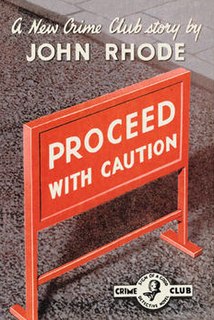
Proceed with Caution is a 1937 detective novel by John Rhode, the pen name of the British writer Cecil Street. It is the twenty seventh in his long-running series of novels featuring Lancelot Priestley, a Golden Age armchair detective. It was published in the United States the same year by Dodd Mead under the alternative title Body Unidentified.
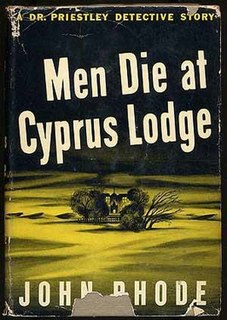
Men Die at Cyprus Lodge is a 1943 detective novel by John Rhode, the pen name of the British writer Cecil Street. It is the thirty eighth in his long-running series of novels featuring Lancelot Priestley, a Golden Age armchair detective. Reviewing it for the San Francisco Chronicle, Anthony Boucher wrote "at his best, nobody can touch Rhode for ingenious murder gadgets and very few can top him for meticulous unravelling; he's very close his best in this one".
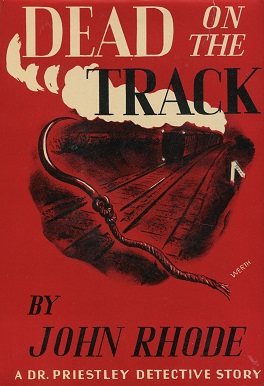
Dead on the Track is a 1943 detective novel by John Rhode, the pen name of the British writer Cecil Street. It is the thirty seventh in his long-running series of novels featuring Lancelot Priestley, a Golden Age armchair detective. Like a number of mystery novels of the era, it has a railway setting. In theme and plot it is very similar to the author's earlier 1931 work Tragedy on the Line. It is the first entry in the series since Hendon's First Case (1935) in which Priestley's old associate Hanslet is the lead investigator. The other recurring police officer in the series Inspector Jimmy Waghorn is now working with military intelligence.
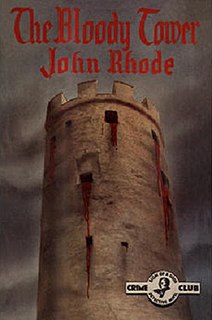
The Bloody Tower is a 1938 detective novel by John Rhode, the pen name of the British writer Cecil Street. It is the twenty ninth in his long-running series of novels featuring Lancelot Priestley, a Golden Age armchair detective. It was published in the United States the same year by Dodd Mead under the alternative title Tower of Evil. It is notable amongst Rhode's more realistic style during the series, for its Gothic elements. For The Guardian E. R. Punshon wrote "in The Bloody Tower Mr. John Rhode gives another excellent example of his eminently satisfactory and solid talent."
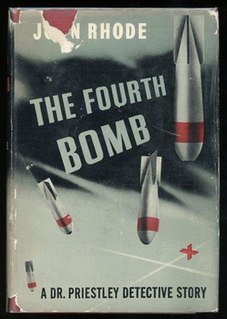
The Fourth Bomb is a 1942 detective novel by John Rhode, the pen name of the British writer Cecil Street. It is the thirty sixth in his long-running series of novels featuring Lancelot Priestley, a Golden Age armchair detective. In The Observer Maurice Richardson wrote "Inspector Waghorn does the investigating, but the evidence is so contradictory and suspicion so widely distributed that the solution calls for Dr. Priestley, whom, you will be sorry to hear, I thought was looking alarmingly shaky. Sound recommendation, of course" while Isaac Anderson in the New York Times wrote "It is merely the familiar Dr. Priestley formula set against the background of wartime England."
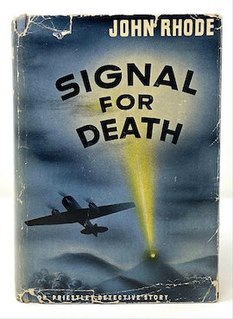
They Watched by Night is a 1941 detective novel by John Rhode, the pen name of the British writer Cecil Street. It is the thirty fifth in his long-running series of novels featuring Lancelot Priestley, a Golden Age armchair detective. It was published in the United States by Dodd Mead with the alternative title Signal for Death.

Death at the Helm is a 1941 detective novel by John Rhode, the pen name of the British writer Cecil Street. It is the thirty fourth in his long-running series of novels featuring Lancelot Priestley, a Golden Age armchair detective. It makes reference to earlier stories in the series as the lawyer had defended in court the murderers Priestley had exposed in The Corpse in the Car and Death on the Boat Train. The characters in it were arguably more complexly drawn than in other books by the author.

Death on the Boat Train is a 1940 detective novel by John Rhode, the pen name of the British writer Cecil Street. It is the thirty second in his long-running series of novels featuring Lancelot Priestley, a Golden Age armchair detective. As in most of the later novels much of the detective footwork is done by Inspector Waghorn of Scotland Yard. The construction of the murder setting bears similarities to Death in the Tunnel, written by Street under his other pen name Miles Burton. With is focus on seemingly unbreakable alibis and railway and ship timetables, it is also similar in style to the Inspector French novels of Freeman Wills Crofts.



















